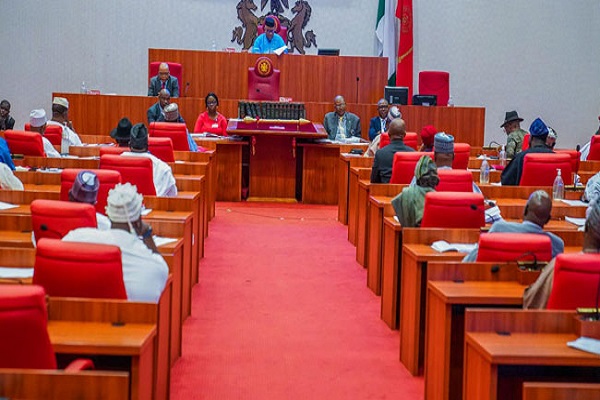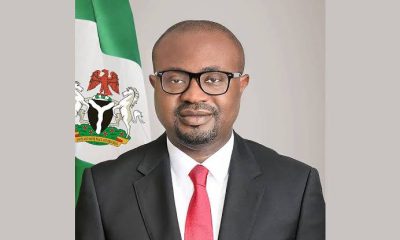News
NSCDC issues operational licenses to 41 private guard companies

The Nigeria Security and Civil Defence Corps (NSCDC) has issued operational licenses to 41 Private Guard Companies (PGCs).
NSCDC Commandant General (CG), Ahmed Audi, represented by DCG Operation, Dauda Mugadi, presented the licenses to the PGCs on Thursday in Abuja.
Audi said the private security industry was an integral part of Nigeria’s security architecture hence the need for them to be professional in carrying out their duties.
He charged them to place priority on crime prevention and protection of lives and properties in their areas of operation.
The CG warned that any compromise of national security will be dealt with decisively.
“Use your experience to promote public interest and socio-economic growth, which only thrives in a crime-free environment.
“As you join the league of players in this industry, you should not compromise standard as the provisions of the PGC Act and regulation must be strictly adhered to.
“National security must not be sacrificed on the altar of pursuit for business profit,” Audi said.
He also warned that companies who violate the codes of operation would be duly sanctioned.
The NSCDC boss urged the operators to constantly share intelligence information and ensure prompt submission of security reports to the Corps.
Audi advised them to track down and report suspicious activities in their areas of operation as they would be held accountable for any breach of security in their domain.
Headline
Prince Harry visits sick Nigerian soldiers in Kaduna

Prince Harry and his team visited the 44 Nigerian Army Reference Hospital in Kaduna to interact with wounded soldiers who are receiving treatment.
The Duke of Sussex is in Nigeria with his wife to champion the Invictus Games, which Harry founded to aid the rehabilitation of wounded and sick servicemembers and veterans.
Nigeria joined the Invictus Community of Nations in 2022 becoming the first African country to join.
Prince Harry’s visit to Kaduna came 68 years after his late grandmother Queen Elizabeth II visited the state during the time of the late Premier of Northern Region Sir Ahmadu Bello.




News
Senate approves death penalty for drug traffickers

Senate on Thursday, May 9, approved the death penalty for those convicted on the charge of drug trafficking in the country.
The punishment prescribed in the extant NDLEA Act is a maximum sentence of life imprisonment.
The resolution of the Senate followed its consideration of a report of the Committees on Judiciary, Human Rights and Legal Matters and Drugs and Narcotics, National Drug Law Enforcement Agency (NDLEA) Act (Amendment) Bill, 2024.
The Chairman of the Committee on Judiciary, Human Rights & Legal Matters presented the report during plenary, Senator Mohammed Monguno (APC-Borno North).
The bill, which passed its third reading, aims to update the list of dangerous drugs, strengthen the operations of the NDLEA, review penalties, and empower the establishment of laboratories.
Section 11 of the current act prescribes that “any person who, without lawful authority; imports, manufactures, produces, processes, plants or grows the drugs popularly known as cocaine, LSD, heroin or any other similar drugs shall be guilty of an offence and liable on conviction to be sentenced to imprisonment for life” was amended to reflect a stiffer penalty of death.
Although the report did not recommend a death penalty for the offence, during consideration, Senator Ali Ndume moved that the life sentence should be upgraded to the death penalty.
During a clause-by-clause consideration of the Bill, Deputy Senate President Barau Jibrin, who presided over the session, put the amendment on the death penalty to a voice vote and ruled that the “ayes” had it.
But Senator Adams Oshiomhole objected to the ruling, saying that the “nays” had it.
He argued that matters of life and death should not be treated hurriedly, but Barau said it was too late, as he failed to call for division immediately after his ruling.
The bill was subsequently read for the third time and passed by the Senate.
-

 Headline6 days ago
Headline6 days agoSuspend cybersecurity levy– Reps to CBN
-

 Business6 days ago
Business6 days agoNigeria needs over $2bn to revive Ajaokuta Steel Plant, says Minister
-

 Headline4 days ago
Headline4 days agoPrince Harry visits sick Nigerian soldiers in Kaduna
-

 Entertainment4 days ago
Entertainment4 days agoAMVCA Cultural Day: BBNaija’s Neo, Venita win Best Dressed Male, Female
-

 Headline6 days ago
Headline6 days agoTinubu resumes work after foreign trip
-

 News6 days ago
News6 days agoShan George’s money returned to Zenith Bank account
-

 Metro4 days ago
Metro4 days agoEx-Sports Minister laments after hospital neglected him for hours over N80000 deposit





